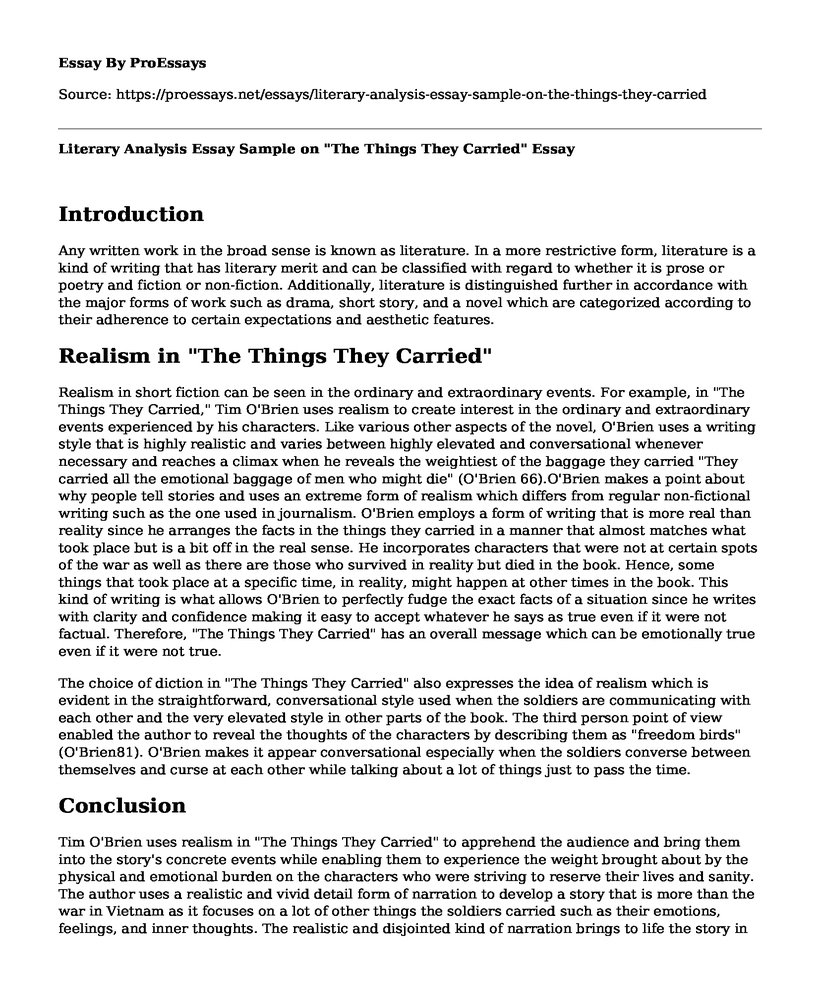Introduction
Any written work in the broad sense is known as literature. In a more restrictive form, literature is a kind of writing that has literary merit and can be classified with regard to whether it is prose or poetry and fiction or non-fiction. Additionally, literature is distinguished further in accordance with the major forms of work such as drama, short story, and a novel which are categorized according to their adherence to certain expectations and aesthetic features.
Realism in "The Things They Carried"
Realism in short fiction can be seen in the ordinary and extraordinary events. For example, in "The Things They Carried," Tim O'Brien uses realism to create interest in the ordinary and extraordinary events experienced by his characters. Like various other aspects of the novel, O'Brien uses a writing style that is highly realistic and varies between highly elevated and conversational whenever necessary and reaches a climax when he reveals the weightiest of the baggage they carried "They carried all the emotional baggage of men who might die" (O'Brien 66).O'Brien makes a point about why people tell stories and uses an extreme form of realism which differs from regular non-fictional writing such as the one used in journalism. O'Brien employs a form of writing that is more real than reality since he arranges the facts in the things they carried in a manner that almost matches what took place but is a bit off in the real sense. He incorporates characters that were not at certain spots of the war as well as there are those who survived in reality but died in the book. Hence, some things that took place at a specific time, in reality, might happen at other times in the book. This kind of writing is what allows O'Brien to perfectly fudge the exact facts of a situation since he writes with clarity and confidence making it easy to accept whatever he says as true even if it were not factual. Therefore, "The Things They Carried" has an overall message which can be emotionally true even if it were not true.
The choice of diction in "The Things They Carried" also expresses the idea of realism which is evident in the straightforward, conversational style used when the soldiers are communicating with each other and the very elevated style in other parts of the book. The third person point of view enabled the author to reveal the thoughts of the characters by describing them as "freedom birds" (O'Brien81). O'Brien makes it appear conversational especially when the soldiers converse between themselves and curse at each other while talking about a lot of things just to pass the time.
Conclusion
Tim O'Brien uses realism in "The Things They Carried" to apprehend the audience and bring them into the story's concrete events while enabling them to experience the weight brought about by the physical and emotional burden on the characters who were striving to reserve their lives and sanity. The author uses a realistic and vivid detail form of narration to develop a story that is more than the war in Vietnam as it focuses on a lot of other things the soldiers carried such as their emotions, feelings, and inner thoughts. The realistic and disjointed kind of narration brings to life the story in "The Things They Carried," and the repetitive nature of narration describes the things the soldiers carried and eventually gives them meaning.
Works Cited
O'Brien, Tim. The Things They Carried. Houghton Mifflin Harcourt, 2011.
Cite this page
Literary Analysis Essay Sample on "The Things They Carried". (2022, Oct 19). Retrieved from https://proessays.net/essays/literary-analysis-essay-sample-on-the-things-they-carried
If you are the original author of this essay and no longer wish to have it published on the ProEssays website, please click below to request its removal:
- Girl, Interrupted: Susanna Kaysen's Memoir
- Rough Draft: Young Goodman Brown Essay
- Paper Example on Overall Value of George Orwell's 1984 in the Contemporary World
- The Iliad and the Archaic Greeks - Essay Sample
- Literary Analysis Essay on Lady Lazarus and Daddy by Sylvia Plath
- Literary Analysis Essay Sample on Deliverance by James Dickey
- Victor Frankenstein Is the True Monster Essay







